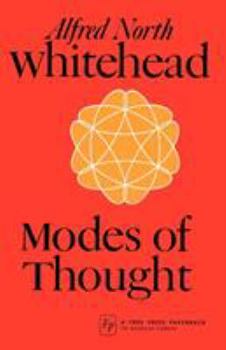Modes of Thought
Select Format
Select Condition 
Book Overview
An English mathematician and philosopher, Alfred North Whitehead provided the foundation for the school of thought known as process philosophy. With an academic career that spanned from Cambridge to Harvard, Whitehead wrote extensively on mathematics, metaphysis, and philosophy. Modes of Thought by Alfred North Whitehead includes chapters on creative impulses and activities as well as the overall aim of philosophy.
Format:Paperback
Language:English
ISBN:002935210X
ISBN13:9780029352106
Release Date:February 1968
Publisher:Fireside
Length:179 Pages
Weight:0.59 lbs.
Dimensions:0.5" x 5.5" x 8.5"
Customer Reviews
3 ratings
Philosopy is either self-evident or it is not Philosophy
Published by Thriftbooks.com User , 18 years ago
AI researchers often referencing Alfred North Whitehead's book "Modes of Thought" in an attempt too explain thought, consciousness, and reasoning. Whitehead's writings suggests that thought has quality of being both conditional and discrete. These two qualities are coveted in AI programming. Whitehead starts by discussing the topics of "Interest and Importance". He covers the topics of interest and importance. Interest drives importance, as either exciters or inhibitors. One becomes interested in his environmental factors and this interest activates a conditional response. To the observer, he believes this process is called thinking, but is following a series of behavioral responses and conditioned beliefs. The outcome of these conditions can be represented by a graph of possible paths. Disbelief is the pruning of certain paths that are dependant on the environmental factors. Consciousness seems to be the awareness or intuition too believe in ones conclusions or disbelieve. Consciousness creatively adds or subtracts conditional states in a person belief tree. The interaction of these states generates discrete and predictable behavior and the observer concludes intelligence is emerging. In reality the system is a series of augmented finite state machines running their algorithms. Interest and importance are the primary reasons for effort after exact discrimination of the sense data. For example, the motion of cars approaching an intersection is the conditioned by signals. The driver watches signals to determine exist lanes, when to stop, the rate of speed, merging into adjacent lanes, and travel spacing. The traffic signals are the outcome of the traffic. Stop lights are added to busy intersection to manage the flow of traffic and reduce confusion on turn taking at the intersection, car pool lanes encourage conservation by consolidation, and large digital messages forewarn of pending changes in traffic flow or detours information. Importance generates interest. Interest leads to discrimination. Finally consciousness develops and gradually and fitfully becomes another agent of stimulation. Consciousness is a human and divine quality. Consciousness is necessary for abstraction and abstraction necessary for proven theorms. Can a machine dream? Can a machine see the future? Can a machine feel? Of course not. A machine is no more conscious than a rock in your garden. Whitehead focuses on the importance of language and usage of language for expression. Feelings are the comprehension is the reception of expression. Language is the triumph of human ingenuity. Language can be both oral and written and the distinction difficult to distinguish. The greatest invention in the past century was the printing press. Today the Internet replaces the printing press and introduces digital publishing as the modern means of communication. Expression tells of widespread intelligence. Voice is produced sound interpretation as natural
The Best Single Introduction to Whitehead's Thought
Published by Thriftbooks.com User , 22 years ago
For the reader looking for a way into the thought of Alfred North Whitehead, this short volume is the best place to begin. In six lectures delivered toward the end of his career, Whitehead provides a non-technical sketch of the metaphysics and cosmology he had earlier presented in extended and highly technical form in his magnum opus, Process and Reality.Modes of Thought is not an easy book--for it is highly compressed and sometimes reads like a series of aphorisms. But while this book will likely leave most readers wondering how all these aphorisms hold together, they are individually nearly crystaline in clarity and are wonderfully provocative. Even if one never reads further in Whitehead, engaging this short volume will set one pondering productively. And, if nothing else, one will come away armed with some wonderful philosophical one-liners.If reading Modes of Thought makes one want to read on, the good way to proceed would be to read Science and the Modern World next followed by Adventures of Ideas and then (and only then) Process and Reality.
A book that will change forever how you see the world.
Published by Thriftbooks.com User , 25 years ago
Whitehead wrote clearly and simply about some of the most difficult philosophical ideas. This brief book is perfect for anyone who has ever wondered "How do I know what I know?" It is filled with gems such as "The notion of a mere fact is the triumph of the abstractive intellect"; "The whole understanding of the world consists in the analysis of process in terms of the identities and diversities of the individuals involved." Today we know a lot more about the machinery of the mind and the nature of human cognition than he did. But like Darwin who didn't really know how "genes" work, Whitehead saw things that most of us miss. You have to think "on your toes" to read him. But the reward is worth the effort. No one who claims to be an educated person should make such a claim without "reading their Whitehead."






